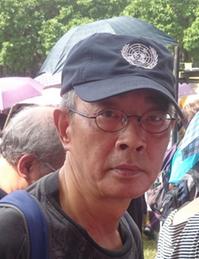 |
|
| Lam Wing-Kee (via) | |
In a chillingly detailed feature titled "The Case of Hong Kong's Missing Booksellers," the New York Times tells of how the Chinese government has sought to control the book business in Hong Kong. Those efforts have increased dramatically in the past several years and most notoriously led to the kidnapping of five Hong Kong booksellers connected with Causeway Bay Books.
"At a national Communist Party congress in October 2017," the Times wrote, "President Xi Jinping made clear the party's expansive vision of control. 'The party exercises overall leadership over all areas of endeavor in every part of the country,' he told delegates. No corner of society was out of reach. Even books--'socialist literature,' in Xi's words--must extol 'our party, our country, our people and our heroes.' A few months later, the government erased presidential term limits, opening the way for Xi to rule indefinitely, and put control of all media, including books, in the hands of the Communist Party's Central Propaganda Department."
The story chronicles decades-long Communist Party suppression of books critical of Chairman Mao and Chinese politics, but constantly returns to the experience of Lam Win-kee, owner and manager of Hong Kong's Causeway Bay Books, who was detained by Chinese police when entering China from Hong Kong on October 24, 2015.
He was held incommunicado in solitary confinement and questioned in depth about customers and the anonymous authors of Causeway Bay Books' publishing sibling, Mighty Current. He was charged with "illegal sales of books" and eventually confessed. Eight months after being taken prisoner, he was told he could return to Hong Kong, but under many conditions. These included telling local police that he had not been abducted, handing over computer files about customers and authors and acting as a mole for the Chinese government. But, as is well-known, he held a press conference, outlining what had happened.
Still, the policy of repression has been effective. As the Times noted: "At the time of Lam's abduction, banned books were everywhere in Hong Kong, sold throughout the city at big-box retailers, specialized cafes and corner convenience stores. Within days of his disappearance, they began to vanish, swept off shelves by mainland-owned shops and frightened independent booksellers. Authors were cowed into silence; presses refused to print sensitive material. The latest act of intimidation occurred this January, when the former owner of Mighty Current, Gui Minhai, who had been granted limited release within China, was abducted again, this time while accompanied by Swedish diplomats on a train to Beijing (he holds Swedish citizenship). When the Swedish government pressed China for details on Gui's whereabouts, the authorities refused to acknowledge that he had been taken. Gui soon appeared in a videotaped confession, apologizing for his supposed crimes and saying the diplomats had tricked him into boarding the train."
Another publisher, Bao Pu, founder of New Century Press, told the Times reporter: "What you're doing is writing an obituary. A post-cremation obituary of these books. I didn't realize it could all disappear so quickly."

